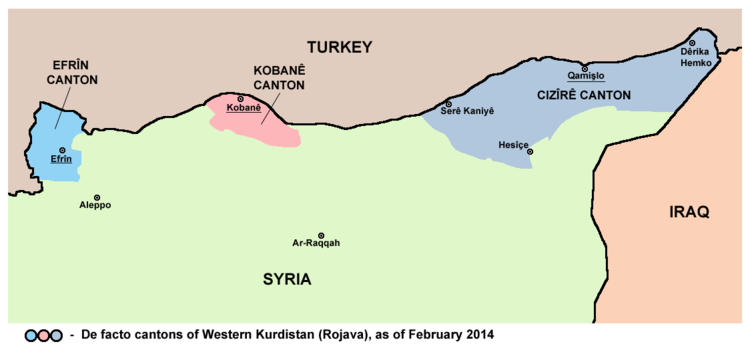By Juan Cole | (Informed Comment) | – –
The intrepid Liz Sly of the Washington Post gets the story of the attempt of the Kurdish People’s Protection Units (YPG) and their Arab allies, the Euphrates Volcano, to cut Daesh (ISIL, ISIS) off and kill it. Sly’s insightful report is buttressed by one from Ahmad al-Sakhani at the Dubai-based al-An TV.
Daesh holds Raqqah Province in Syria, up to the small town of Tel Abyad on the Syrian-Turkish border, through which it receives weapons, ammunition and volunteers smuggled through Turkey. On either side of Daesh territory in northern Raqqah Province are two cantons of the Kurdish belt known as Rojava. The two are Kobane and Jazira. Jazira is much bigger and abuts the Kurdistan Regional Government of Iraq. Altogether there are probably about 2.2 million Kurds in Syria (a country of 22 million), though it may be less since several hundred thousand were forced to flee to Turkey from Raqqah.
The YPG, the paramilitary of the far-left Democratic Union Party, and its Arab allies have taken 12 villages near to Tal Abyad away from Daesh in recent fighting. An important point: According to al-An TV, this advance has only been possible because of close coordination between the ground forces and the US Air Force, which is bombing Daesh targets once they are identified by the rebel fighters. In other words, this fight looks a little like the battle for Mt. Sinjar in Iraq, where Kurdish fighters got practical air support from the US and its coalition partners, which intensively bombed Daesh positions and equipment on their behalf. At Mt. Sinjar, YPG units played an important role, but the major push came from the Peshmerga of the Kurdistan Regional Government, Iraqi Kurdistan, who knew how to call in US air strikes.
Some 12,000 residents of the latter town have fled, expecting that a battle royale in the center of the town is in the offing between Daesh on the one hand and the YPG alongside the Free Syrian Army units calling themselves Euphrates Volcano on the other. Some 5,000 refugees are huddling along the border with Syria.
If the Kurds can take the northern Raqqa corridor along the Turkish border, including Tel Abyad, they can link two of their scattered cantons and can cut Daesh off from resupply routes in Turkey.
Abu Isa, the leader of the 2,000 Arab fighters of the Arab side of the Euphrates Volcano joint operations room, called on villagers to remain in their homes, promising them they would be safe. His demi-brigade seems to be well armed, having medium and light weaponry, suggesting that the US is provisioning them.
Al-An maintains that a lot of Daesh fighters have pulled back from the north to the capital city of Raqqah, and that the remaining fighters have warned local inhabitants to stay inside on threat of condign punishment.
There is a saying in the military that everyone wants to do strategy, but real men do logistics. That is, the supply train for the army is often more crucial than the big concept plan of battle. Liz Sly showed that she is the ‘real man’ of this somewhat sexist saying.
There has been a lot of back and forth between Daesh and the Kurds in the northeastern Jazira region, especially at the city of Hasaka. What is promising here is that the anti-Daesh forces appear to be getting good air support from the American-led coalition. It helps that Euphrates Volcano has not gone jihadi and is what is left of the Free Syrian Army.




 © 2025 All Rights Reserved
© 2025 All Rights Reserved